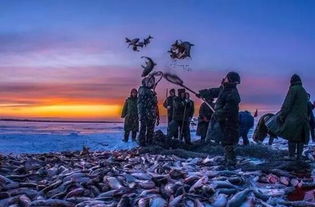本文目录导读:
- Understanding Winter Fish Behavior
- Choosing the Right Gear
- Hooking Techniques for Winter
- Winter-Specific Lures and Baits
- Final Tips
Winter fishing can be a serene and rewarding experience, offering anglers the chance to connect with nature in a tranquil setting. However, the cold weather brings its own set of challenges, particularly when it comes to hooking fish effectively. Here are some essential fishing techniques tailored for the winter season to help you land those elusive winter fish.
Understanding Winter Fish Behavior
Before diving into the specifics of hooking techniques, it's crucial to understand how fish behave during the winter months. Cold water temperatures cause fish to slow down their metabolism, making them less active and more selective about their prey. Here are some key points to consider:
Lower Activity Levels: Fish tend to move slower and cover less ground in the winter. This means you need to be patient and present your bait or lure in a way that mimics natural movements.
Shallow Waters: Many fish move to shallower waters during the winter to stay warmer. Targeting these areas can increase your chances of success.

Warm Water: Fish often gather around warm water sources, such as springs, river currents, or sunny spots. These areas can be hotspots for winter fishing.
Choosing the Right Gear
The right gear can make a significant difference in your winter fishing experience. Here are some essential pieces of equipment to consider:
Lighter Tackle: Since fish are less active, lighter tackle can help you present your bait more delicately without spooking them.
Sensitive Reels: A reel with a smooth drag and a sensitive drag system is crucial for detecting subtle bites in cold water.
Ice-Fishing Rods: If you're ice fishing, a specialized rod designed for the task can provide better control and sensitivity.
Hooking Techniques for Winter
Now that you have the right gear and an understanding of fish behavior, let's delve into the specifics of hooking techniques:
Natural Presentation: In winter, fish are more likely to strike out of curiosity rather than hunger. Present your bait or lure in a natural, lifelike manner. Avoid erratic movements and try to mimic the natural behavior of the prey you're imitating.
Fine-Tuning Your Hook Set: When a fish takes your bait, be patient. Wait for a few seconds before setting the hook. This gives the fish time to engulf the bait fully. However, be quick enough to ensure a good hookset.
Deep Hooking: In cold water, fish are less likely to take the bait in the mouth. Deep hooking can help secure the fish without causing unnecessary stress. Aim to hook the bait at the back of the fish's mouth or through the lips.
Using Live Bait: Live bait can be highly effective in winter. The natural movements and scent of live bait can entice even the most cautious fish. Use baits like minnows, leeches, or worms, depending on the species you're targeting.
Adjusting Your Technique Based on Conditions: Pay attention to the weather and water conditions. On sunny days, fish may be more active, allowing for more aggressive presentations. On overcast days or during windy conditions, a more subtle approach may be necessary.
Winter-Specific Lures and Baits
In addition to live bait, there are several lures and artificial baits that can be effective in winter:
Jigs: Jigs can be deadly in winter, especially when fished around structure or in deeper water. Vibrate the jig to mimic struggling prey.
Spoons: spoons can be worked slowly or twitched to attract the attention of winter fish. Their bright colors can stand out in the murky winter water.
Soft Plastics: Soft plastics like grubs, worms, and swimbaits can be deadly when presented in a lifelike manner. Rig them on a light jighead and work them slowly through the water column.
Final Tips
Layer Up: Dress in warm, waterproof clothing to stay comfortable during your fishing trip. The cold can sap your energy quickly, making it harder to fish effectively.
Monitor Your Equipment: Regularly check your hooks, lines, and leaders for signs of wear and tear. A frayed line or a bent hook can lead to lost fish.
Stay Informed: Keep an eye on weather forecasts and water conditions. Winter fishing can be unpredictable, and being prepared can make all the difference.
By mastering these winter fishing techniques and understanding the behavior of fish during the cold months, you'll be well-equipped to hook and land those big ones, even in the depths of winter. Happy fishing!












